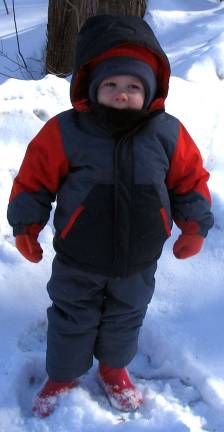It was so cold in 1816 that ...

WARWICK — On Sunday, Feb. 15, the National Weather Service issued an urgent "Hazardous to Potentially Life Threatening" warning for this area with a wind chill advisory through Monday morning.
The ominous forecast predicted seven degrees below zero with wind chill temperatures as low as 27 degrees below zero along with gusts up to 40 mph.
And the below average cold weather was expected to continue throughout the week.
The warning stated that the hazardous wind chills could cause frostbite and even hypothermia if precautions such as proper clothing and limited time outdoors were not taken.
Warwick has experienced some severe winter weather but most residents do not recall below zero temperatures.
"If the temperature falls to minus seven degrees tonight," said Town of Warwick Historian Dr. Richard Hull, "I'd say it's the coldest night I've personally experienced in town."
However, Intellicast.com, which delivers site-specific forecasts for 60,000 sites in the U.S. and around the globe, reported that the record low for February in Warwick, 18 below zero, occurred in 1955.
In his "People of the Valleys Revisited, 1700-2005," Hull discusses Warwick's weather history.
"The coldest year in the recorded history of Warwick was 1816 when the temperature fell a few degrees below zero on several occasions in January and February," he said also, adding some unusual weather facts. "We were hit by a snowstorm on June 17 and on the 4th of July Wickham Lake had an inch of ice on it."
Hull believes that at that time this was caused by the eruption of Mount Tambora in Indonesia in 1815, which spewed billions of tons of ash into the atmosphere/stratosphere and produced unprecedented global cooling.
"It was said," he added, "that snow never left the ground that year."
He reported that in 1836 the temperature went below zero on several occasions and on March 12, 1888, we had more than 24 inches of snow and considerable drifting.
One of the deepest snowfalls of the 20th century, he added, occurred in 1947.
Hull believes that paradoxically, it is now global warming that is bringing colder and wetter winter weather to much of our region.
"It would seem that weather extremes before the 20th century were mainly caused by short-term volcanically-triggered global cooling while those of the 21st century were from gradually escalating industrially-induced carbon emissions which have resulted in global warming and charges in our wind and oceanic water systems," he said. "And my guess is that in our future we'll see more ice and snow and more extremes in temperature followed by more extensive spring flooding. Today, the main fault, dear citizens, is not in the mouths of volcanoes but in vehicular tailpipes and industrial smokestacks."
- Roger Gavan